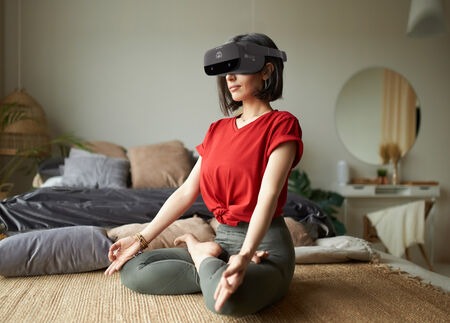Virtual reality (VR) gaming is an immersive experience that is growing in popularity. With its ability to transport players into a different world, it can provide an escape from reality and a chance to experience new things. However, there is a growing concern about the impact of VR gaming on mental health and well-being. In this article, we will examine the potential effects of VR gaming on our mental health and explore the ways in which it can be used to promote positive well-being.
One of the key benefits of VR gaming is its ability to provide a sense of escapism. This can be especially beneficial for people who are dealing with stress, anxiety, or depression. By allowing players to enter a new world, VR gaming can provide a much-needed break from the challenges of everyday life. This can help reduce stress and promote relaxation, leading to improved mental health and well-being.
Moreover, VR gaming also has the potential to improve cognitive function and promote physical activity. By providing an interactive experience, VR gaming can stimulate the brain and help improve problem-solving skills, memory, and attention. Additionally, many VR games require players to physically move around, providing a low-impact form of exercise that can improve physical health and well-being.
However, despite the potential benefits of VR gaming, there are also concerns about its impact on mental health. For example, some experts have raised concerns about the potential for VR gaming to become addictive, leading to social isolation and neglect of other important aspects of life. Additionally, there is also the risk of players becoming overly immersed in the VR world, leading to feelings of disorientation and confusion upon returning to reality.
Another potential issue is the impact of VR gaming on our perceptions of reality. By creating a highly immersive experience, VR gaming has the potential to distort our perceptions of the real world. This can lead to feelings of anxiety, depression, and even paranoia, particularly in individuals who are already prone to mental health problems.
Furthermore, VR gaming can also expose players to potentially traumatic experiences and violence, which can have a negative impact on their mental health. For example, players may be subjected to frightening or violent scenarios in games, which can lead to feelings of stress, anxiety, and even post-traumatic stress disorder (PTSD). It is important for game developers to consider these potential effects and to ensure that VR games are designed in a way that minimizes the risk of negative impacts on players’ mental health.
Despite these concerns, VR gaming also has the potential to be used as a tool for promoting positive mental health and well-being. For example, VR therapy has been used successfully in the treatment of various mental health conditions, including anxiety, depression, and post-traumatic stress disorder (PTSD). By allowing patients to confront and overcome their fears in a safe and controlled environment, VR therapy can be an effective way of promoting positive mental health and well-being.
Additionally, VR gaming can also be used to promote physical activity and improve cognitive function in individuals with disabilities or mobility issues. By providing a safe and accessible form of exercise, VR gaming can help improve physical health and well-being in these individuals.
In conclusion, while VR gaming has the potential to have both positive and negative impacts on mental health and well-being, it is important to consider both its benefits and potential risks when evaluating its impact. By being mindful of the potential negative effects, game developers can ensure that VR gaming is designed in a way that promotes positive well-being and minimizes the risk of negative impacts on mental health. Additionally, VR gaming can be used as a tool for promoting positive mental health and well-being, particularly in the context of therapy and rehabilitation. As the technology continues to evolve and become more widespread, it is important for researchers to study the effects of VR gaming on mental health and well-being, in order to better understand its impact and develop strategies for promoting positive outcomes. This may involve creating guidelines for game development, monitoring the use of VR gaming, and conducting research to determine its effects on various populations, including children, adults, and individuals with mental health conditions.

